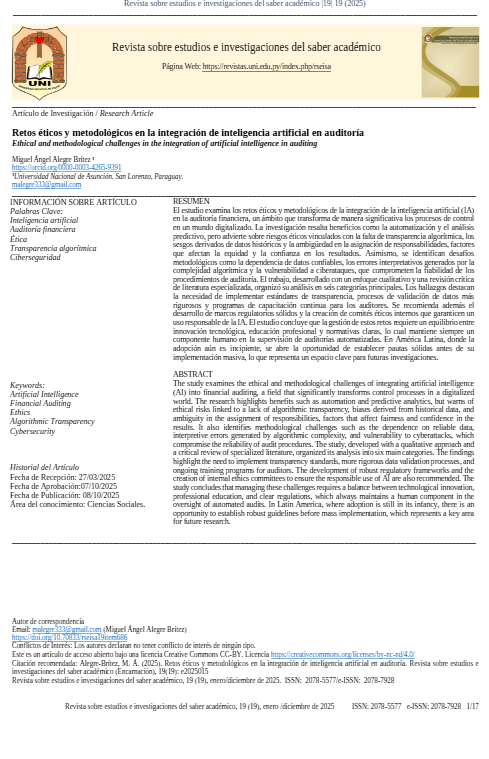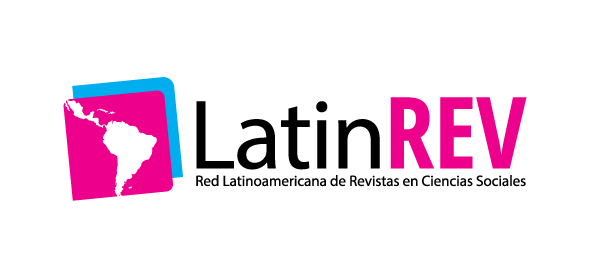Ethical and methodological challenges in the integration of artificial intelligence in auditing
DOI:
https://doi.org/10.70833/rseisa19item686Keywords:
artificial intelligence, financial auditing, ethics, algorithmic transparency, cybersecurityAbstract
The study examines the ethical and methodological challenges of integrating artificial intelligence (AI) into financial auditing, a field that significantly transforms control processes in a digitalized world. The research highlights benefits such as automation and predictive analytics, but warns of ethical risks linked to a lack of algorithmic transparency, biases derived from historical data, and ambiguity in the assignment of responsibilities, factors that affect fairness and confidence in the results. It also identifies methodological challenges such as the dependence on reliable data, interpretive errors generated by algorithmic complexity, and vulnerability to cyberattacks, which compromise the reliability of audit procedures. The study, developed with a qualitative approach and a critical review of specialized literature, organized its analysis into six main categories. The findings highlight the need to implement transparency standards, more rigorous data validation processes, and ongoing training programs for auditors. The development of robust regulatory frameworks and the creation of internal ethics committees to ensure the responsible use of AI are also recommended. The study concludes that managing these challenges requires a balance between technological innovation, professional education, and clear regulations, which always maintains a human component in the oversight of automated audits. In Latin America, where adoption is still in its infancy, there is an opportunity to establish robust guidelines before mass implementation, which represents a key area for future research.
Downloads
References
Abadia Elias, M., Arruda Faversani, L., Vieira Moreira, J. A., Viapiana Masiero, A., & Veronez da Cunha, N. (2024). Inteligencia artificial en salud y sus implicaciones bioéticas: Una revisión sistemática. Revista Bioética, 31, e3542PT. https://doi.org/10.1590/1983-803420233542ES
Alastruey Merino, C. F. (2021). Estado de la cuestión de la inteligencia artificial y los sistemas de aprendizaje autónomo. Sociología y tecnociencia: Revista digital de sociología del sistema tecnocientífico, 11(2), 182-195. https://dialnet.unirioja.es/servlet/articulo?codigo=8155421
Albán López, V. L., Ramírez Cotacachi, J. M., Ruiz Lita, E. P., & Sandoval Malquìn, D. M. (2024). Control interno de cuentas por cobrar para mejorar la información financiera. Gestio et Productio: Revista Electrónica de Ciencias Gerenciales, 6(Extra 1), 24-34. https://dialnet.unirioja.es/servlet/articulo?codigo=9847790
Aldahray, A. (2024). Notes Readability and Discretionary Accruals. Revista de Contabilidad, 27(2), 229-238. https://doi.org/10.6018/rcsar.459281
Al-Shattarat, B. (2024). The influence of leverage on accrual-based and real earnings management: Evidence from the UK. Revista de Contabilidad, 27(2), 239-248. https://doi.org/10.6018/rcsar.499761
Anderson, S. B., Mendoza, K. I., & Mongold, C. (2025). The Effect of Intangible Asset Classification on Professional Financial Statement Users’ Assessments. Journal of Accounting Research, 1475-679X.12604. https://doi.org/10.1111/1475-679X.12604
Ascencio Contreras, P. H., & Berttolini Díaz, G. M. (2024). Auditoría como herramienta para el éxito empresarial. Publicaciones e Investigación, 18(2), 3. https://dialnet.unirioja.es/servlet/articulo?codigo=10012689
Ashraf, M., Donelson, D. C., McInnis, J., & Mergenthaler, R. D. (2025). Fair value accounting standards and securities litigation. Journal of Accounting and Economics, 79(1), 101705. https://doi.org/10.1016/j.jacceco.2024.101705
Bai, M., Dong, N., Zhang, H., Zhang, J., & Xu, J. (2025). How personal values influence earnings management ethics: The mediation role of moral disengagement. Spanish Journal of Finance and Accounting / Revista Española de Financiación y Contabilidad, 54(1), 86-109. https://doi.org/10.1080/02102412.2024.2406337
Bandeira, A. M., & Almeida, J. E. F. D. (2024). Effects of firm life cycle on matching and accrual quality. Revista Contabilidade & Finanças, 35(96), e1817. https://doi.org/10.1590/1808-057x20241817.en
Barrainkua Aroztegi, I., Aldazabal Etxeberria, M. E., & Espinosa-Pike, M. (2024). Improving work outcomes in audit firms: The mediating role of perceived organizational support. Revista de Contabilidad, 27(2), 331-343. https://doi.org/10.6018/rcsar.529101
Barrera Guerra Jr., J. L., & Hinojosa Cruz, A. V. (2025). El grado de aplicación del modelo de control interno COSO 2013 y su efecto en la rentabilidad de las empresas públicas mexicanas no SEC. Contaduría y Administración, 70(3), 514. https://doi.org/10.22201/fca.24488410e.2025.5007
Blasco Leante, J. E., Baños-Caballero, S., & García-Teruel, P. J. (2024). Debt maturity in Spanish small business startups. Revista de Contabilidad, 27(2), 323-330. https://doi.org/10.6018/rcsar.487681
Bonrath, A., & Eulerich, M. (2024). Internal auditing’s role in preventing and detecting fraud: An empirical analysis. International Journal of Auditing, ijau.12342. https://doi.org/10.1111/ijau.12342
Caro Puro, R., Hernández Borreguero, J. J., & Donoso Anes, A. (2024). Management and accounts of the disentailment process in Seville Cathedral (19th century): The sale of estates. Revista de Contabilidad, 27(2), 249-259. https://doi.org/10.6018/rcsar.532831
Chakrabarty, B., Hyman, M., & Krishnan, G. V. (2024). Audit outcomes of non‐financial misconduct. International Journal of Auditing, ijau.12347. https://doi.org/10.1111/ijau.12347
Chau, J. (2025). Accounting Information Usage and Trading by Retail Investors: Evidence from Integrated Trading Platform. Journal of Accounting Research, 1475-679X.12606. https://doi.org/10.1111/1475-679X.12606
Cuervo Sánchez, C. A. (2021). Efectos de la inteligencia artificial en las estrategias de marketing: Revisión de literatura. aDResearch: Revista Internacional de Investigación en Comunicación, 24, 26-41. https://dialnet.unirioja.es/servlet/articulo?codigo=7705935
Dudycz, T. (2024). Operating leverage: A critical analysis of the concept and the methods of measurement. Revista de Contabilidad, 27(2), 195-211. https://doi.org/10.6018/rcsar.509111
Fajardo Aguilar, G. M., Ayala Gavilanes, D. C., Arroba Freire, E. M., & López Quincha, M. (2023). Inteligencia Artificial y la Educación Universitaria: Una revisión sistemática. Magazine de las Ciencias: Revista de Investigación e Innovación, 8(1), 109-131. https://doi.org/10.33262/rmc.v8i1.2935
García-Acuña, L. T., Zambrano-Andrade, F. I., Acuña-Chong, M. G., & Acuña-Cumba, M. L. (2023). Oportunidades y desafíos en la aplicación de la inteligencia artificial en la educación superior. Revista Científica Arbitrada de Investigación en Comunicación, Marketing y Empresa REICOMUNICAR. ISSN 2737-6354., 6(12 Ed. esp.), Article 12 Ed. esp. https://doi.org/10.46296/rc.v6i12edespoct.0172
Garcia-Blandon, J., Argilés-Bosch, J. M., & Ravenda, D. (2025). The impact of board gender quotas on analyst recommendations: A difference-in-differences analysis. Revista de Contabilidad, 28(1), 71-83. https://doi.org/10.6018/rcsar.525891
González-Morales, M., Cavero-Rubio, J. A., & Amorós-Martínez, A. (2025). The role of political foundations in the bank indebtedness of political parties: The case of Spain. Spanish Journal of Finance and Accounting / Revista Española de Financiación y Contabilidad, 54(1), 1-22. https://doi.org/10.1080/02102412.2024.2365533
Gonzalo Quiroga, M. (2023). La inteligencia artificial en el arbitraje internacional 2.0. Oportunidades y desafíos en un futuro que ya es presente. CUADERNOS DE DERECHO TRANSNACIONAL, 15(2), 516-550. https://doi.org/10.20318/cdt.2023.8067
Gunardi, A., Badavath, S., & Mathur, S. (2025). Evaluating the moderating effect of online shopping attitude on online impulsive shopping; A study of Indian emerging market shoppers. Contaduría y Administración, 70(3), 505. https://doi.org/10.22201/fca.24488410e.2025.5023
Hancu-Budui, A., & Zorio-Grima, A. (2024). New Public Governance and Public Value Co-creation: The Case of the European Court of Auditors Environmental Audits. Revista de Contabilidad, 27(2), 275-287. https://doi.org/10.6018/rcsar.519241
Hayes, R. M., Jiang, F., Pan, Y., & Tang, H. (2025). Racial Disparities in Financial Complaints and the Role of Corporate Social Attitudes. Journal of Accounting Research, 1475-679X.12612. https://doi.org/10.1111/1475-679X.12612
Isack, M., & Aschauer, E. (2024). The Role of CSR Report Assurance and ESG Rating in Bank Manager’s Judgement on ESG Lending Decisions. International Journal of Auditing, ijau.12369. https://doi.org/10.1111/ijau.12369
Jo, E. H., Lee, J. W. (Jenny), & Scott, T. (2025). Is Communication Between the Auditor and Audit Committee Associated With Stock Price Crash Risk? International Journal of Auditing, ijau.12372. https://doi.org/10.1111/ijau.12372
Kang, Y. (2025). Financial Reporting Around Private Firms’ Securities Offerings. Journal of Accounting Research, 1475-679X.12598. https://doi.org/10.1111/1475-679X.12598
Kazim, I., Wang, F., Nie, D., & Jameel Hussain, M. (2025). Can more able CEOs reduce the gap between internal and external CSR disclosures? Revista de Contabilidad, 28(1), 84-95. https://doi.org/10.6018/rcsar.557871
Klann, R. C., & Giordani, M. D. S. (2024). Uso de mídia social pelo CEO e a relevância da informação contábil. Revista de Contabilidade e Organizações, 18, e224767. https://doi.org/10.11606/issn.1982-6486.rco.2024.224767
Lee, J., Jung, S., & Cho, H. (2025). Managerial ability and tax avoidance adjustment toward the optimal level. Spanish Journal of Finance and Accounting / Revista Española de Financiación y Contabilidad, 54(1), 57-85. https://doi.org/10.1080/02102412.2024.2380954
Lee, S. Y., & Marinovic, I. (2025). Dynamic Information Acquisition, Investment, and Disclosure. Journal of Accounting Research, 1475-679X.12610. https://doi.org/10.1111/1475-679X.12610
León, D. A., Martínez Cuenca, J. G., Ardila Sánchez, I. A., & Mosquera Palacios, D. J. (2022). Inteligencia artificial para el control de tráfico en redes de datos: Una Revisión. Entre ciencia e ingeniería, 16(31), 17-24. https://doi.org/10.31908/19098367.2655
Li, B., & Wang, A. Y. (2024). On the EPA’s Radar: The Role of Financial Reports in Environmental Regulatory Oversight. Journal of Accounting Research, 62(5), 1849-1900. https://doi.org/10.1111/1475-679X.12572
Martínez-Comesaño, M., Rigueira-Díaz, X., Larrañaga-Janeiro, A., Martínez-Torres, J., Ocarranza-Prado, I., & Kreibel, D. (2023). Impacto de la inteligencia artificial en los métodos de evaluación en la educación primaria y secundaria: Revisión sistemática de la literatura. Revista de Psicodidáctica, 28(2), 93-103. https://doi.org/10.1016/j.psicod.2023.06.001
Mohammed Al-Matari, E. (2025). Do corporate environmental sustainability affect corporate performance? The role of board diversity evidence from Saudi Arabia stock market. Contaduría y Administración, 70(3), 507. https://doi.org/10.22201/fca.24488410e.2025.5591
Molina-Sánchez, H., De Vicente-Lama, M., & Ortiz-Gómez, M. D. M. (2025). Interpretation of the concept of liabilities in lease accounting. Revista de Contabilidad, 28(1), 57-70. https://doi.org/10.6018/rcsar.538161
Monterrey Mayoral, J., & Rabazo Martín, A.-E. (2025). How are accounting irregularities examined in Spanish insolvency proceedings? An empirical analysis. Revista de Contabilidad, 28(1), 151-164. https://doi.org/10.6018/rcsar.577941
Muñoz Pérez, S. P., Mendoza Peña, J. G., & Quispe Vílchez, M. B. (2022). Una revisión sobre el rol de la inteligencia artificial en la industria de la construcción. Ingeniería y competitividad: revista científica y tecnológica, 24(2), 1-23. https://dialnet.unirioja.es/servlet/articulo?codigo=8637552
Ndlovu, M. O., & Schutte, D. P. (2024). An evaluation of tax compliance among small businesses. South African Journal of Accounting Research, 1-19. https://doi.org/10.1080/10291954.2024.2372132
Olarte-García, M., Hidalgo-Barrios, B. V., & Flores-Barrios, L. (2023). Los beneficios contables y fiscales en el régimen de las Actividades Agrícolas, ganaderas, silvícolas y pesqueras. Revista Biológico Agropecuaria Tuxpan, 11(2), 230-238. https://doi.org/10.47808/revistabioagro.v11i2.517
Peña Breffe, R., & del Toro Ríos, J. C. (2023). Generalidades sobre una norma contable para la agricultura cubana. Cofin Habana, 17(2). http://scielo.sld.cu/scielo.php?script=sci_abstract&pid=S2073-60612023000200009&lng=es&nrm=iso&tlng=es
Peñarrieta Villarroel, W. R. (2023). Análisis e interpretación de la Norma Internacional de Auditoría (NIA 500) relacionada a la evidencia de auditoria [Tesis de grado, Universidad Mayor de San Andrés]. http://repositorio.umsa.bo/xmlui/handle/123456789/33245
Pinto Morales, A. A. (2023). El control de calidad y la gestion de La sociedad de auditoría, Gutierrez Pinto & Asociados, Sede en Jesus María—Año 2021 [Tesis de grado, Universidad Peruana de las Américas]. http://repositorio.ulasamericas.edu.pe/xmlui/handle/123456789/4015
Quick, R., & Yalçin, N. (2024). The Impact of Combating Bribery and Corruption Report Assurance on Financial Analysts’ Decisions. International Journal of Auditing, ijau.12370. https://doi.org/10.1111/ijau.12370
Ruiz-Barbadillo, E., Martinez-Conesa, I., Serrano-Madrid, J., & Brown-Liburd, H. (2024). Audit Risk Management and Audit Effort in Small and Medium Audit Firms. Revista de Contabilidad, 27(2), 212-228. https://doi.org/10.6018/rcsar.462211
Saona, P., Muro, L., & López-Quesada, E. (2025). An integrated corporate governance index for Spain: From construction to construct validity. Revista de Contabilidad, 28(1), 32-56. https://doi.org/10.6018/rcsar.535401
Schoeman, A. (2024). An exploratory study on supplier acceptance of and engagement in a national tax lottery designed to improve tax compliance. South African Journal of Accounting Research, 1-21. https://doi.org/10.1080/10291954.2024.2393913
Ştefănescu, C. A. (2025). Towards a conceptualised belief-action-outcome model for enhanced non-financial reporting: A systematic and integrative review. Revista de Contabilidad, 28(1), 115-132. https://doi.org/10.6018/rcsar.568861
Stein, E., & Cunha, P. R. D. (2024). Professional skepticism of internal auditors and perception of risks in internal controls. Revista Contabilidade & Finanças, 35(96), e1922. https://doi.org/10.1590/1808-057x20241922.en
Urdaneta Camacho, R., Guevara Pérez, J. C., Martín Vallespín, E., & Llena Macarulla, F. (2025). ’Creative accounting’ in the Spanish professional football League: An attempt to dodge the rules economic control? Revista de Contabilidad, 28(1), 180-192. https://doi.org/10.6018/rcsar.553911
Vázquez Oteo, O., Garcia-Torea, N., & De La Cuesta-González, M. (2025). Corporate corruption management: A proposal for an accountability framework. Revista de Contabilidad, 28(1), 96-114. https://doi.org/10.6018/rcsar.543701
Wu, S., Zhu, J., & Wu, T. (2025). The impact of CEO founder and CEO age on new ventures performance: A quantile regression analysis for U.S. IPOs. Revista de Contabilidad, 28(1), 3-17. https://doi.org/10.6018/rcsar.553941
Yang, L., & Yang, P. (2024). Market conditions, investor sentiment and disposition effect. An empirical study based on China’s stock market. Revista de Contabilidad, 27(2), 260-274. https://doi.org/10.6018/rcsar.529401

Published
How to Cite
License
Copyright (c) 2025 Miguel Alegre

This work is licensed under a Creative Commons Attribution 4.0 International License.
Creative Commons Attribution License CC-BY
You are free to:
Share — copy and redistribute the material in any medium or format.
Adapt — remix, transform, and build upon the material for any purpose, including commercially.
Under the following terms:
Attribution — You must give appropriate credit, provide a link to the license, and indicate if any changes have been made. You may do so in any reasonable way, but not in any way that suggests that you or your use is endorsed by the Licensor.






